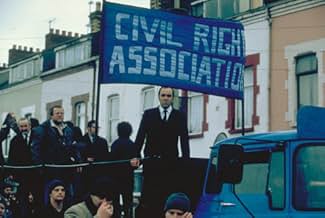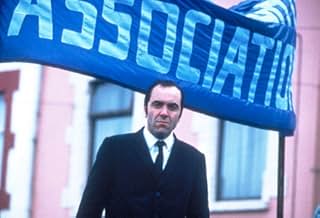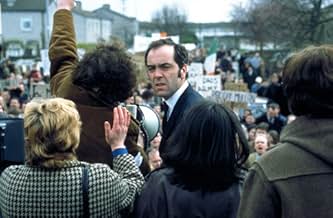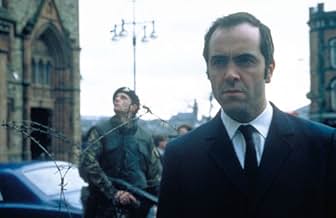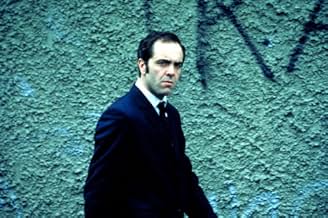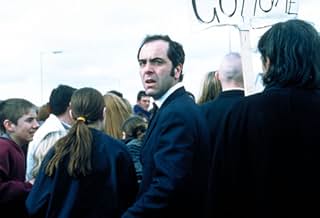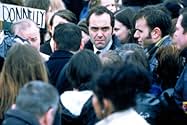AVALIAÇÃO DA IMDb
7,6/10
26 mil
SUA AVALIAÇÃO
Uma dramatização da marcha de protesto dos direitos civis irlandeses e a subsequente massacre pelas tropas britânicas em 30 de janeiro de 1972.Uma dramatização da marcha de protesto dos direitos civis irlandeses e a subsequente massacre pelas tropas britânicas em 30 de janeiro de 1972.Uma dramatização da marcha de protesto dos direitos civis irlandeses e a subsequente massacre pelas tropas britânicas em 30 de janeiro de 1972.
- Direção
- Roteirista
- Artistas
- Ganhou 1 prêmio BAFTA
- 19 vitórias e 23 indicações no total
Carmel McCallion
- Bridget Bond
- (as Carmel Mccallion)
Christopher Villiers
- Maj. Steele
- (as Chris Villiers)
Avaliações em destaque
I have seen "Bloody Sunday" twice now - once on the big screen and once on DVD - and read Don Mullen's book, "Eyewitness Bloody Sunday." This movie is a very realistic depiction of the defining moment of the "troubles" in Northern Ireland. The hand-held cameras and grainy film style make it feel more like a documentary than a movie, which of course is the intent. As another reviewer has mentioned, the acting is very natural throughout. It does take some time to get started, but once the the shooting starts it hits the viewer like a sledgehammer. Very powerful.
The film jumps so frequently from scene to scene that at times it is distracting, though I was much less annoyed by this the second time around. And, having seen it once with and once without subtitles, I must say that although the subtitles (optional on the DVD) are intrusive they are quite welcome. I love the Irish accent but at times it can be difficult for me to decipher,and much of the dialogue in the movie is muted. It was good to know what was being said.
As for the objectivity, of course the movie is slanted - so was the situation. But it is not unreasonably slanted. The British are not shown as one-dimensional demons - in particular, Nicholas Farrell does a great job of conveying Brigadier Mclellan's ambiguity and even disapproval of the course taken against his wishes by the supposed "Observer," Maj. Gen. Ford (who, if the movie has a villain, is the prime candidate.) At one point early on several Paras are discussing the day's prospects, and reveal how tired they are of being harassed, shot at and otherwise abused by the native population. This makes the day's events more understandable. This does not EXCUSE the cold-blooded gunning down of 27 people - there is no excuse for that - but at least one can see a contributing factor. And protesters are shown, once or twice, firing back. (The key here is firing BACK - evidence indicates that no marchers fired until the first two protesters were wounded. And those scattered few that attempted return fire were quickly dissuaded by their countrymen. Later in the day the IRA did go into action, but not until after the bloodletting in Bogside was over with.) Ivan Cooper's (James Nesbitt) words at the close of the film were shown to be all too true in the years since the actual incident. The IRA was on unsteady legs at the time, but has never lacked support since January 30, 1972.
The film is a powerful object lesson concerning the misuse of force, and one that governments everywhere - including my own country, the United States - should take to heart. It has a few flaws, but I think deserves the awards it has received. 8/10 points.
The film jumps so frequently from scene to scene that at times it is distracting, though I was much less annoyed by this the second time around. And, having seen it once with and once without subtitles, I must say that although the subtitles (optional on the DVD) are intrusive they are quite welcome. I love the Irish accent but at times it can be difficult for me to decipher,and much of the dialogue in the movie is muted. It was good to know what was being said.
As for the objectivity, of course the movie is slanted - so was the situation. But it is not unreasonably slanted. The British are not shown as one-dimensional demons - in particular, Nicholas Farrell does a great job of conveying Brigadier Mclellan's ambiguity and even disapproval of the course taken against his wishes by the supposed "Observer," Maj. Gen. Ford (who, if the movie has a villain, is the prime candidate.) At one point early on several Paras are discussing the day's prospects, and reveal how tired they are of being harassed, shot at and otherwise abused by the native population. This makes the day's events more understandable. This does not EXCUSE the cold-blooded gunning down of 27 people - there is no excuse for that - but at least one can see a contributing factor. And protesters are shown, once or twice, firing back. (The key here is firing BACK - evidence indicates that no marchers fired until the first two protesters were wounded. And those scattered few that attempted return fire were quickly dissuaded by their countrymen. Later in the day the IRA did go into action, but not until after the bloodletting in Bogside was over with.) Ivan Cooper's (James Nesbitt) words at the close of the film were shown to be all too true in the years since the actual incident. The IRA was on unsteady legs at the time, but has never lacked support since January 30, 1972.
The film is a powerful object lesson concerning the misuse of force, and one that governments everywhere - including my own country, the United States - should take to heart. It has a few flaws, but I think deserves the awards it has received. 8/10 points.
Normally I don't enjoy the handheld documentary style films, as they tend to induce waves of nausea, but Bloody Sunday had me riveted from the word go. That we already know how it's going to end is irrelevant, the pressure building on the day of the march is almost unbearable. Though there's been criticism that the film is slanted towards the republican point of view, I found it balanced, even in the depiction of the soldiers and officers. Everybody certainly looked the part and I went away feeling some sympathy for both sides. Given the close quarters and inflammatory nature of the conflict, it's amazing that bloodbaths like this (soldiers blasting civilians) haven't happened more often in Northern Ireland. It's only now, that retired soldiers have broken ranks and talked about what actually happened, that a film like this can see the light of day.
"Bloody Sunday" is a very startling, cinema-verite recreation of a very specific date (January 30, 1972), in a very specific place (Derry, Northern Ireland) of an event that for the Irish became "our Sharpeville."
But for an American audience with no benefit of subtitles for the brogues and working class Brit accents, no explanations outside of eventual context for lingo and slang (it took me awhile to keep track of "provos" vs "paras"), the quasi-documentary, in-your-face approach takes on a tragic universality.
It could be part of a Cassandra trilogy with `Black Hawk Down' and `No Man's Land' about why military should not be in charge in urban strife, whether as "peacekeepers" or in civil wars or regime changes, no matter how heinous the regime to be changed. A lesson for the Baghdad invasion planners?
Cities are complicated social ecologies, and the film shows a great diversity of attitudes and pressures on all sides, managing to be both clinical in meticulous detail and visceral in shocking impact. The film is probably not objective about the British (I don't think it's a coincidence that the imperious Brit "observer" who takes repugnant charge is played by Tim Pigott-Smith who was a similar colonialist in `The Jewel in the Crown.") A central universal image becomes the awesome power of rock-throwing, unemployed teen-age boys to spark war.
The liberals in the middle, clinging to dreams of Gandhi, Martin Luther King, and fair community relations, are morally destroyed over the course of a few hours and the extremists with guns on both sides feed on each other in perpetual destruction like the ouroboros image of the snake eating itself. I kept feeling I missed the exact flash point in a wandering attention moment and wanted to immediately re-watch it to see if I could track the gotcha! moment when escalation could have been prevented, so I look forward to this being available on video tape.
But the film does clearly show that it was attitudes that created the violent outcome and consequent government non-investigation, as we see in so many police situations. Once soldiers enter a city it is a police situation with all those complexities.
I know James Nesbitt primarily from frothy Irish comedies, like `BallykissAngel,' so his staggering portrayal of the M.P. in the middle is a revelation, as he goes from planning a civil rights march to pleading with his girlfriend to physical heroism to a break-down in shock.
The version of the titular U2 song played out at the end, running well past the credits finish, is a moving, live, passionate audience sing-along where Bono shouts out other locales that have experienced similar situations to emphasize the universality.
But for an American audience with no benefit of subtitles for the brogues and working class Brit accents, no explanations outside of eventual context for lingo and slang (it took me awhile to keep track of "provos" vs "paras"), the quasi-documentary, in-your-face approach takes on a tragic universality.
It could be part of a Cassandra trilogy with `Black Hawk Down' and `No Man's Land' about why military should not be in charge in urban strife, whether as "peacekeepers" or in civil wars or regime changes, no matter how heinous the regime to be changed. A lesson for the Baghdad invasion planners?
Cities are complicated social ecologies, and the film shows a great diversity of attitudes and pressures on all sides, managing to be both clinical in meticulous detail and visceral in shocking impact. The film is probably not objective about the British (I don't think it's a coincidence that the imperious Brit "observer" who takes repugnant charge is played by Tim Pigott-Smith who was a similar colonialist in `The Jewel in the Crown.") A central universal image becomes the awesome power of rock-throwing, unemployed teen-age boys to spark war.
The liberals in the middle, clinging to dreams of Gandhi, Martin Luther King, and fair community relations, are morally destroyed over the course of a few hours and the extremists with guns on both sides feed on each other in perpetual destruction like the ouroboros image of the snake eating itself. I kept feeling I missed the exact flash point in a wandering attention moment and wanted to immediately re-watch it to see if I could track the gotcha! moment when escalation could have been prevented, so I look forward to this being available on video tape.
But the film does clearly show that it was attitudes that created the violent outcome and consequent government non-investigation, as we see in so many police situations. Once soldiers enter a city it is a police situation with all those complexities.
I know James Nesbitt primarily from frothy Irish comedies, like `BallykissAngel,' so his staggering portrayal of the M.P. in the middle is a revelation, as he goes from planning a civil rights march to pleading with his girlfriend to physical heroism to a break-down in shock.
The version of the titular U2 song played out at the end, running well past the credits finish, is a moving, live, passionate audience sing-along where Bono shouts out other locales that have experienced similar situations to emphasize the universality.
10mariobc
I saw this film about 2 years ago, and was extremely impressed with the realism of the film.Having served with the British Army in Northern Ireland many years later I found the atmosphere and the general appearance and manner of the Paras extremely accurate, as I have seen many films about Ireland when trying to portray British soldiers they unfortunately could of done a little better. I consider myself to be open minded and understood and sympathized with the local catholic population during these events as this is or was pretty much how things are with regards to the catholic population in Northern Ireland.For me, the main good points were that the film was made in a documentary style in which the facts were shown in a straight to the point manner without any fancy computer effects or handsome faces portraying the main players. well done to the production team !!!!
Powerful, provocative & prompting, Bloody Sunday is a meticulously researched, expertly crafted & thoroughly gripping recreation of the Bogside massacre that occurred in the Northern Ireland town of Derry when British troops opened fire on civilians during a protest march, killing 14 & wounding just as many in the process.
Dramatising the events that led to the tragic incident on January 30, 1972, Bloody Sunday follows a civil right activist named Ivan Cooper who was the central organiser of the peaceful rally against internment that ended when British army paratroopers began firing on the unarmed demonstrators in full view of the public & the press.
Written & directed by Paul Greengrass, the movie sets its foreboding tone right within the opening segment after which it takes a step back to put its pieces on the board but once the stage is set, it explodes & moves forward with stunning immediacy. Greengrass' direction is at its very best when things go south & the whole episode is extensively detailed in the script.
Cinematography employs the quasi-documentary-style to film the entire event as it unfolds, thus bringing the viewers right into the conflict, while the frenetic hand-held camera-work further reflects the chaotic nature of such circumstances. Editing is slick for the most part, music is nearly absent and its cast contributes with convincing performances, playing their given roles with utmost sincerity.
On an overall scale, Bloody Sunday is a fiercely directed, deftly scripted, viciously photographed, skilfully edited & brilliantly performed movie that brings the dreadful event to life with remarkable precision, brims with intense emotions from start to finish, and not only works as a riveting thriller but also as an unsettling documentary. Disturbing & disquieting but essential viewing nonetheless, Bloody Sunday is strongly recommended.
Dramatising the events that led to the tragic incident on January 30, 1972, Bloody Sunday follows a civil right activist named Ivan Cooper who was the central organiser of the peaceful rally against internment that ended when British army paratroopers began firing on the unarmed demonstrators in full view of the public & the press.
Written & directed by Paul Greengrass, the movie sets its foreboding tone right within the opening segment after which it takes a step back to put its pieces on the board but once the stage is set, it explodes & moves forward with stunning immediacy. Greengrass' direction is at its very best when things go south & the whole episode is extensively detailed in the script.
Cinematography employs the quasi-documentary-style to film the entire event as it unfolds, thus bringing the viewers right into the conflict, while the frenetic hand-held camera-work further reflects the chaotic nature of such circumstances. Editing is slick for the most part, music is nearly absent and its cast contributes with convincing performances, playing their given roles with utmost sincerity.
On an overall scale, Bloody Sunday is a fiercely directed, deftly scripted, viciously photographed, skilfully edited & brilliantly performed movie that brings the dreadful event to life with remarkable precision, brims with intense emotions from start to finish, and not only works as a riveting thriller but also as an unsettling documentary. Disturbing & disquieting but essential viewing nonetheless, Bloody Sunday is strongly recommended.
Você sabia?
- CuriosidadesTo make this movie as authentic as possible, no lights were used in the movie and the camera work was entirely hand-held
- Erros de gravaçãoThe marchers carry homemade cardboard signs with slogans written on them. When shown from behind, some have modern printing ("Made in China") on them that are not appropriate for 1972.
- Citações
Ivan Cooper: I just want to say this to the British Government... You know what you've just done, don't you? You've destroyed the civil rights movement, and you've given the IRA the biggest victory it will ever have. All over this city tonight, young men... boys will be joining the IRA, and you will reap a whirlwind.
- Cenas durante ou pós-créditosThe live rendition of U2's Sunday, Bloody Sunday continues to play for a full three minutes over a black screen after the credits finish rolling.
- ConexõesFeatured in The 2003 IFP Independent Spirit Awards (2003)
Principais escolhas
Faça login para avaliar e ver a lista de recomendações personalizadas
Detalhes
- Data de lançamento
- Países de origem
- Idioma
- Também conhecido como
- Domingo sangriento
- Locações de filme
- Empresas de produção
- Consulte mais créditos da empresa na IMDbPro
Bilheteria
- Orçamento
- £ 2.000.000 (estimativa)
- Faturamento bruto nos EUA e Canadá
- US$ 773.228
- Fim de semana de estreia nos EUA e Canadá
- US$ 29.419
- 6 de out. de 2002
- Faturamento bruto mundial
- US$ 1.758.689
- Tempo de duração
- 1 h 51 min(111 min)
- Cor
- Mixagem de som
- Proporção
- 1.85 : 1
Contribua para esta página
Sugerir uma alteração ou adicionar conteúdo ausente

